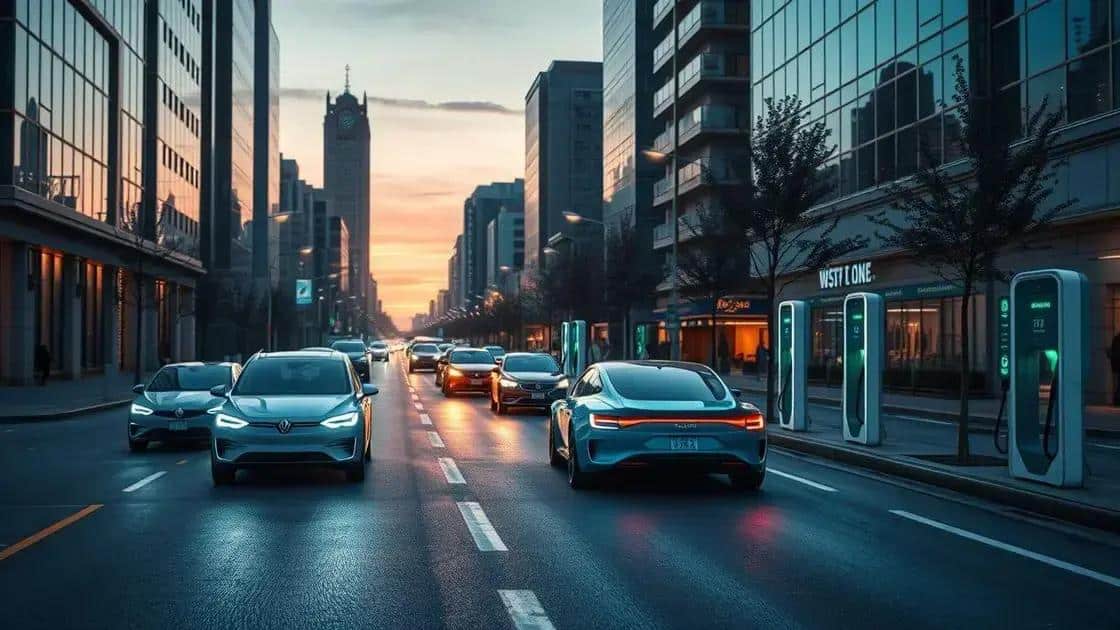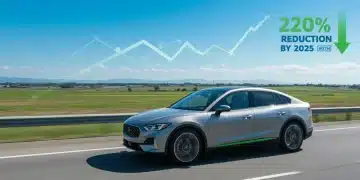Insights on electric vehicle news: what you need to know

The future predictions for electric vehicles include advancements in battery technology, wider adoption due to government incentives, increased charging infrastructure, and the integration of autonomous driving technologies.
Insights on electric vehicle news reveal a rapidly evolving landscape. As electric vehicles continue gaining popularity, what does this mean for consumers and the industry alike? Let’s dive into the latest updates and trends shaping the future of transportation.
Latest trends in electric vehicle technology
The electric vehicle (EV) market is evolving quickly, with new advancements coming out constantly. Keeping up with the latest trends in electric vehicle technology is essential for consumers and businesses alike. From battery improvements to software advancements, let’s explore what is changing.
Advancements in Battery Technology
Battery technology is at the forefront of electric vehicle innovation. Innovative companies are now developing batteries that charge faster and last longer. These advancements provide more range and efficiency for EVs, making them more appealing to drivers.
- New lithium-sulfur batteries promise higher energy density.
- Solid-state batteries are being tested for safety and efficiency.
- Recycling used batteries is becoming more common.
As battery technologies progress, consumers can expect improved performance and cost-effectiveness in EVs.
Software and Connectivity Enhancements
Software updates play a significant role in managing the performance and features of electric vehicles. With connected technologies, cars are more than just transportation; they become part of your digital ecosystem.
Features like over-the-air updates mean that your vehicle can improve without visiting a service center. Furthermore, enhanced connectivity allows for better navigation, safety features, and even driver assistance.
- Real-time traffic data helps find the best routes.
- Improved safety features include collision detection.
- Smart drivers can make informed decisions through mobile apps.
As technology advances, drivers will notice more integration between their cars and personal devices, enhancing their overall experience.
Another significant trend is the development of autonomous driving features. Many manufacturers are investing in artificial intelligence to improve the safety and efficiency of their vehicles. Self-driving capabilities can revolutionize the way we think about transportation, allowing for stress-free travel on hundreds of miles.
Overall, staying informed about the latest trends in electric vehicle technology helps consumers make educated choices. As innovations emerge, the landscape of transportation continues to shift, ensuring that electric vehicles remain an attractive option for many.
Impact of government policies on EV adoption

Government policies play a crucial role in the adoption of electric vehicles (EVs). These policies can either encourage or inhibit the growth of the EV market. Understanding the impact of government policies on EV adoption is essential for consumers and manufacturers alike.
Subsidies and Incentives
Many governments offer subsidies and incentives to promote the transition to electric vehicles. These initiatives aim to make EVs more affordable for consumers. When potential buyers see financial benefits, they are more likely to consider switching to an electric vehicle.
- Tax credits significantly reduce the overall cost of purchasing an EV.
- Grants for charging infrastructure installation increase accessibility.
- Lower registration fees can make EV ownership more attractive.
These financial incentives encourage consumers to embrace EV technology, reflecting positively on environmental goals.
Regulations and Standards
Regulatory standards also influence the EV market. Governments enforce regulations to ensure emissions are reduced, compelling manufacturers to innovate. More stringent fuel economy standards lead to the production of better EVs, encouraging adoption.
As manufacturers comply with these regulations, they invest in cleaner technologies that enhance vehicle performance. For instance, many countries now set mandates for emissions reductions, pushing industries toward electric mobility.
When governments set ambitious targets for EV sales, it creates a clear direction for manufacturers. This can spark competition among automakers to develop more efficient and appealing electric models.
Furthermore, local governments play a role by investing in charging infrastructure. Expanding this infrastructure makes it easier for consumers to choose electric vehicles, knowing they have access to charging stations. This accessibility is essential for tackling range anxiety, a common concern among potential EV buyers.
In summary, the impact of government policies on EV adoption is significant. By creating favorable conditions for consumers and manufacturers alike, these policies can drive the growth of the electric vehicle market while promoting sustainable practices.
Challenges faced by the electric vehicle industry
The electric vehicle (EV) industry faces several challenges that can hinder its growth. Understanding these challenges faced by the electric vehicle industry is crucial for consumers, manufacturers, and policymakers.
High Costs of Production
One significant challenge is the high cost of production for electric vehicles. While prices have decreased recently, they remain higher than traditional gasoline vehicles. The cost of batteries contributes largely to this. Battery materials, such as lithium and cobalt, can be expensive and difficult to source.
- Raw material prices fluctuate, impacting overall production costs.
- Manufacturing processes require substantial investment in technology.
- Economies of scale have not yet been fully realized in the EV sector.
As a result, many consumers are hesitant to switch to EVs when prices remain high.
Limited Charging Infrastructure
Another critical challenge is the limited charging infrastructure. While the number of charging stations is increasing, many areas still lack adequate access to charging facilities. This can discourage potential buyers who worry about finding charging stations during long trips.
Moreover, charging times can be longer than refueling a gasoline vehicle, which can further dissuade consumers. Building a robust charging network plays a crucial role in increasing EV adoption and alleviating range anxiety.
As more charging stations become available, the convenience of owning an electric vehicle will improve significantly.
Additionally, the availability of renewable energy sources for charging EVs remains limited in some regions. This can lead to concerns about the environmental impact of electricity production if it comes from fossil fuels rather than clean energy.
Competition from Traditional Vehicles
Competition from traditional fuel vehicles poses another challenge. Many consumers remain loyal to gasoline-powered cars due to their familiarity and perceived reliability. Significant marketing efforts are needed to change consumer perceptions about electric vehicles.
Furthermore, the automotive industry is rapidly evolving, with many manufacturers introducing new models and features. This can create a crowded market, making it more challenging for electric vehicles to stand out.
Despite these challenges, the electric vehicle industry is poised for growth. Continued advancements in technology and government support will help to address these issues.
Future predictions for electric vehicles

The future of electric vehicles (EVs) looks promising as technology continues to advance. Exploring the future predictions for electric vehicles reveals exciting possibilities for consumers and manufacturers alike.
Technological Advancements
One key trend is the rapid advancement in battery technology. Companies are working hard to create batteries that charge faster and last longer. Innovations like solid-state batteries may soon replace traditional lithium-ion batteries.
- Batteries are expected to have higher energy density.
- Charging times may be reduced to just minutes.
- Battery lifespans could increase significantly, reducing waste.
These advancements will make electric vehicles more appealing and practical for everyday use.
Wider Adoption and Infrastructure Growth
As EV technology becomes more accessible, the adoption rate is likely to increase. Government policies supporting renewable energy initiatives will also encourage more consumers to switch from gasoline to electric vehicles. With expanded charging infrastructure, drivers will feel more confident about owning an EV.
Many cities are planning to enhance charging networks, making it easier for EV owners to find reliable charging stations. As the charging infrastructure develops, the use of EVs in urban areas will become more convenient.
Alongside this, ongoing improvements in public transportation with electric buses and vehicles will promote broader EV usage, reducing overall carbon footprints.
Integration of Autonomous Technology
An interesting prediction is that electric vehicles will integrate more autonomous technologies. Companies are already developing self-driving systems. This combination of electric and autonomous vehicles could revolutionize travel.
Imagine a future where you can summon an autonomous electric car to take you where you need to go! This shift may solve several issues, including traffic congestion and parking challenges.
Overall, innovations in the electric vehicle sector show a bright future. With advancements in technology, infrastructure improvements, and the introduction of autonomous features, the world of transportation is set to change dramatically.
In conclusion, the future of electric vehicles is bright and full of exciting possibilities. With advancements in battery technology and expanded charging infrastructure, the world is moving towards a sustainable transportation system. Governments are playing a vital role in encouraging EV adoption through incentives and regulations. As electric vehicles become more affordable and convenient, we can expect to see a significant increase in their use. The integration of autonomous technology will further enhance the driving experience, making travel easier and more efficient. Embracing these changes will help create a cleaner and greener future for everyone.
FAQ – Frequently Asked Questions About Electric Vehicles
What are the benefits of electric vehicles?
Electric vehicles offer lower operating costs, reduced emissions, and quieter operation compared to traditional gasoline vehicles.
How long does it take to charge an electric vehicle?
Charging times vary based on the charger type, but most electric vehicles can be charged in a few hours using a standard home charger.
What incentives are available for buying an electric vehicle?
Many governments offer tax credits, rebates, and grants to help reduce the purchase cost of electric vehicles.
Are electric vehicles really better for the environment?
Yes, electric vehicles produce zero tailpipe emissions and are more environmentally friendly, especially when charged with renewable energy sources.





